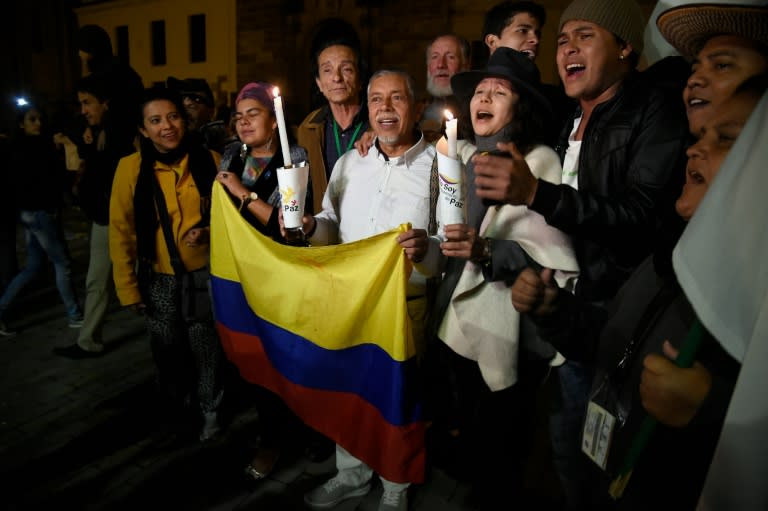As FARC, government step toward peace, ELN under fire for pipeline attack
Colombia's top negotiator questioned Sunday the ELN's intentions to launch peace talks after an attack on a southern oil pipeline, criticism that came one day after the country's government and FARC rebels announced a revised peace accord. The modified deal between the government and the FARC comes after voters in a referendum rejected a prior peace accord to end 52 years of armed conflict. The Colombian military said over the weekend that members of the ELN had activated an improvised explosive device causing a pipeline blast 100 meters from a kindergarten that left behind an oil slick in a nearby riverbed. "This is the kind of anti-humanitarian gesture, besides being reprehensible, that calls into question those who say they want to start a peace process," the government's lead negotiator, Juan Camilo Restrepo, said Sunday on Twitter. The government and the ELN, the second largest guerrilla group in the country, had planned to launch public peace talks on October 27 in Quito. President Juan Manuel Santos cancelled the negotiations after the rebels failed to release hostage ex-congressman Otis Sanchez. The government and the FARC meanwhile announced over the weekend a new peace deal to end more than half-a-century of violent civil strife. "We have reached a new final agreement to end the armed conflict, which incorporates changes, clarifications and some new contributions from various social groups, which we have gone through one by one," said a joint statement read out by diplomats from Cuba and Norway, the peace process guarantors. "Building a stable, lasting peace must be the shared commitment of all Colombians, and one that helps polarization be overcome while including all social and political voices," the statement added. - 'A better agreement' - Santos stressed that the new peace deal between the FARC and the government "is a better agreement." "We made adjustments, tweaks and changes in 56 of the 57 issues that were addressed," Santos said, so "we can build a deeper and broader peace." The modified agreement leaves intact the accord's major tenets, including the FARC laying down its arms and becoming a political party. It includes a number of "innovations" to several of the key points in the original peace deal, according to the government's lead negotiator Humberto de la Calle. The new accord was fine-tuned after the groups that opposed the original deal submitted proposed changes as starting points for negotiations. "The tweaks and clarifications we have made do not undermine the issues we agreed on, which shaped the first peace deal," De la Calle said. Santos acknowledged that a suggestion seeking to bar rebel leaders involved in serious crimes from elections was not part of the re-worked peace deal. He also hinted that the new accord would maintain the provision that FARC rebels could avoid prison time by confessing and carrying out acts of reparation to victims. But he added that there would be specifications concerning the "effective restriction of their freedom." The agreement also states that foreign magistrates will not be allowed on special tribunals to hear cases about those involved in the conflict. - 'An important step forward' - At the moment, neither side has made any mention of the new peace deal being put before a new referendum vote. The original deal's fiercest opponents included Alvaro Uribe, who requested that spokespeople of the opposition be able to review the new text. The United States hailed the agreement, and pledged continuing US support in implementing a peace under which the guerrillas would demobilize and become a political party. US Secretary of State John Kerry said in a statement that the new accord "constitutes an important step forward on Colombia's path to a just and durable peace." The UN Secretary-General Ban Ki-moon said he "commends the efforts" of the FARC and the Colombian government and reaffirmed UN support for the peace process. "Colombians have listened to one another and have reaffirmed their collective desire for peace," Ban said. "They now have a new opportunity to go forward on this road to peace more unified than before." The Revolutionary Armed Forces of Colombia (FARC) and Santos' government had been meeting since October 22 to try to rescue a peace deal that has taken four years to negotiate. In an October 2 referendum, voters unexpectedly rejected the peace agreement, deeming it too soft on the country's largest rebel group. The development was a blow to Santos, who won the Nobel Peace Prize last month for his efforts to bring "total peace" to Colombia. The FARC and the ELN are the last two leftist guerrilla groups involved in a messy, multi-sided conflict that has killed more than 260,000 people, left seven million displaced and 45,000 more people missing.




